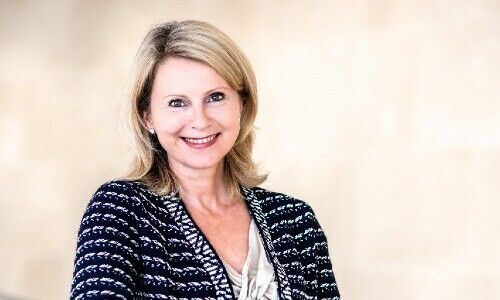UBS is now earning considerably more in its long-stagnating business with Europe's wealthy onshore, according to top executive Christine Novakovic. She told finews.com about tough measures and Covid complications.
The Swiss giant has spent recent years undoing some of its previous European onshore wealth management initiative, including offloading an Austrian business and reportedly thinking of doing the same in Spain. Notably, UBS CEO Ralph Hamers left Europe uncommented on in his April strategy update, with Asia and North America as prominent growth markets instead.
UBS earned $500 million in the first quarter pre-tax profit in the wider European, Middle East, and Africa, or EMEA, region across all of its activities – only the Americas was heftier. The EMEA region, where Christine Novakovic is head of wealth management in Europe as well as a Frankfurt-based hub for the region, is benefiting from market ructions.
«Volatile markets helps us, and of course our brand,» she told finews.com. UBS stands for financial strength and stability, characteristics which the wealthy in particular seek out in crises.
Buoyant Net New Money
The wealth unit is benefiting from word of mouth: «Net new money exceeded our expectations considerably,» said Novakovic, the 56-year-old Tyrolean who oversees onshore as well as offshore wealth management.
The «Europe» bank earned substantially more last year than in previous ones, with each region contributing, she said. Even Germany, where UBS and other Swiss rivals have been struggling to break even, is profitable. «This year, we'll top even that result,» Novakovic said, after less than six months of 2021.
Difficult Decisions
The momentum is new since the launch of UBS Europe in 2016: the European bank's 1,900 employees managed just 144 billion euros ($172 billion) and posted 46.7 million in profit two years ago, which represents the most recent data. Of 12 country markets, less than half were profitable.
For «Christl», this represented a tough row to hoe, finews.com wrote nine months ago. «When I took over the business three years ago, we took clear and sometimes difficult decisions and repositioned businesses,» she said. UBS is now benefiting from these measures, she added.
Focus On Super-Rich
Specifically, she sifted out less-wealthy clients in Europe to tech-empowered teams instead of a devoted personal private banker – a bid to focus more strongly on the wider region's lucrative ultra-rich. «The private bank is pursuing a clear strategy of concentrating on middle- and large-sized high net worth clients between 10 billion and 30 million euros,» she said.
The ultra-rich segment – generally viewed as $50 million and up – comes on top of that, she noted. Previously, UBS had like other Swiss wealth managers catered to affluent clients in neighboring Germany, for example. The shift has led to a higher average asset under management per adviser. The segment is «highly profitable,» Novakovic said. She has also lavished money on marketing to raise visibility.
«Deeply Touched»
Her ebullience comes against the backdrop of a retreat from Austria, one of the markets in Europe where UBS is turning a profit. «The Austria sale touched me deeply because we have an excellent team there and are profitable,» she said. Nevertheless, UBS hadn't viewed the business as potentially reaching the critical mass it needed to be considered a strategic market
While much of UBS's focus is on how to grow in Asia and America, the byword in Europe is profitability. A gargantuan technology migration project is meant to create efficiencies and improve profitability; until now, Germany and Italy are «live» on the costly platform effort.
Buying In Core Markets?
Novakovic, who joined UBS ten years ago following a three-year stint as an art dealer including during the financial crisis, was mum on whether the Swiss bank is looking to get out of more, smaller European markets. This would fill its coffers to acquire in larger ones.
UBS was reportedly among potential suitors for Germany's Lampe, snapped up by Fosun last year. Novakovic didn't comment on Lampe, Germany, or Spain, where UBS is reportedly also shopping its onshore unit.
Culture At Risk
Meanwhile, her focus is on sharpening the unit's numbers. «The step-by-step improvement in profitability and the honing of our business model is intellectually very stimulating,» she said. The pandemic lockdown has also complicated business: «Our corporate culture, the pride in our brand are threatened by forced working from home,» she said.
The European bank has tested a variety of new formats to counteract this, including virtual escape rooms, cooking classes, or sporting competitions where Novakovic's team placed fifth in a 1 million steps competition, she proudly notes.




































